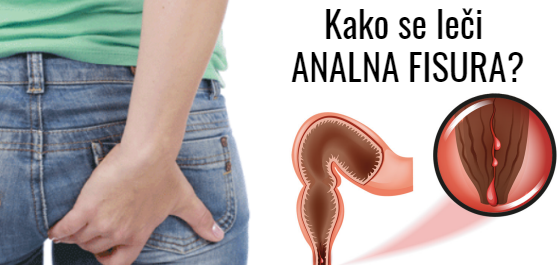Pain is the most common cause of a visit to the doctor. When the pain is intense, the patients most often demand an emergency reaction to relieve the pain. The pain intensity that an anal fissure most commonly causes disrupts the everyday functions of the patient. An anal fissure is a small tear in the moist tissue that lines the anus. It often leads to intense pain and bleeding while the stool is passing through the anal canal. These symptoms can sometimes lead to a spasm in the sphincter in the ending area of the digestive tract. The patients can sometimes identify the anal fissure and clearly define the painful area during the examination. Along with the tear, a fold can be seen in the skin nearby which is manifested as a palpable swelling on the skin of the anal canal.
An anal fissure is a consequence of constipation, passing of a hard stool, long-term diarrhea, or anal sex. Rarer causes can be related to inflammatory colon diseases, malign processes in the digestive tract, tuberculosis, or some sexually transmitted diseases such as HIV or syphilis. These rare causes are often manifested through an anal fissure and commonly represent a complication with an already-diagnosed systemic disease.
In case of painful symptoms or blood in the stool, the patient must report to a doctor. For the previously mentioned symptoms, they should report to surgeons specializing in coloproctology. An anal fissure can be approached in two ways. The first approach, regardless of the painful symptoms, implies a conservative treatment that is based on changing the hygienic-dietary regimen. It will also regulate the stool consistency and the rhythm of the discharge. It is necessary to eat food that is rich in fiber and drink more water. The treatment also includes using a local medication, such as ointments, lotions, or suppositories that decrease the inflammation, ameliorate the epithelialization and help the stool pass through. Considering that the muscle contraction in the ending area of the digestive tract leads to difficulties in the healing of the tear, specially-made treatments that are based on nitro-glycerin are used.
Some complications that may occur with an anal fissure are an inability to heal (which then becomes a chronic anal fissure), recidivism or the fissure reappearing after it has been successfully treated, or the fissure deepening and spreading to the sphincter.
If the conservative treatment doesn’t provide beneficial results, operative treatment should be considered. When choosing the surgeon, it is necessary to find one that specializes in coloproctology and can adequately solve the problem, with minimal trauma, considering that it’s a region that regulates that stool and is responsible for its consistency. Surgery that isn’t adequate can lead to damage of the sphincter or early recidivism of the anal fissure.
Atlas General Hospital takes pride in our team of experienced coloproctologists that spent their lives treating the previously mentioned diseases and expanding their education in the country and abroad. The expert approach enables adequate treatment if the decision on surgical treatment is made on time.
Make your appointment in our hospital today and make the decision that will improve your quality of life and relieve you from any difficulties you may face when doing your everyday life activities.
